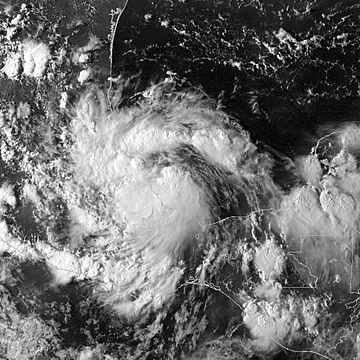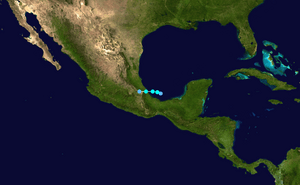Tropical Storm Jose (2005) facts for kids
| Tropical storm (SSHWS/NWS) | |

Tropical Storm Jose on August 22.
|
|
| Formed | August 22, 2005 |
|---|---|
| Dissipated | August 23, 2005 |
| Highest winds | 1-minute sustained: 60 mph (95 km/h) |
| Lowest pressure | 998 mbar (hPa); 29.47 inHg |
| Fatalities | 6 direct, 2 indirect |
| Damage | $45 million (2005 USD) |
| Areas affected | Central Mexico |
| Part of the 2005 Atlantic hurricane season | |
Tropical Storm Jose was a powerful but very short-lived storm. It formed on August 22, 2005, and disappeared just one day later on August 23. Jose was the tenth named storm of the 2005 Atlantic hurricane season. It brought heavy rain and strong winds to eastern Mexico.
Jose caused about $45 million in damage. Sadly, it also led to the deaths of eight people. Most of these deaths happened because of landslides caused by the heavy rain.
Contents
How Tropical Storm Jose Formed and Moved
Tropical Storm Jose started as a "tropical wave" on August 17. This is like a ripple in the atmosphere that can grow into a storm. It moved across the Caribbean Sea. As it got closer to the Yucatán Peninsula, it started to get stronger.
The storm then moved into the southwestern Gulf of Mexico. On August 22, it quickly grew into Tropical Depression Eleven. This happened about 110 miles (175 km) east of Veracruz, Mexico. Just six hours later, it became Tropical Storm Jose.
Jose's Landfall and Weakening
Jose kept getting stronger as it moved toward the coast. It made "landfall" in the state of Veracruz early on August 23. Landfall means the center of the storm moved over land. At this point, its winds were about 60 mph (90 km/h).
Even though an eye was starting to form, Jose was not quite strong enough to be a hurricane. After hitting land, Tropical Storm Jose quickly lost power. It disappeared that same afternoon in the mountains of central Mexico. This was only 24 hours after it first formed!
Getting Ready for the Storm
Because Tropical Storm Jose formed so close to the coast, people had very little time to prepare. A "tropical storm warning" was given out on August 22. This warning tells people that tropical storm conditions are expected.
People along the Veracruz coastline had less than 9 hours of warning. The warning area was made larger as Jose got stronger. However, it was canceled soon after the storm hit land. The main danger from Jose was expected to be heavy rainfall.
What Happened After the Storm
Tropical Storm Jose caused a lot of damage in Mexico. It hurt crops, highways, and homes. Many areas in the state of Veracruz were flooded. About 80,000 people had to go to shelters for safety.
The government of Veracruz estimated the damage to be around $45 million (in 2005 US dollars). About 120 cities felt the effects of the rain. However, most of the damage happened in eight cities. These included Martínez de la Torre and Misantla.
| City | Rainfall |
|---|---|
| Misantla | 10.4 in (26.42 mm) |
| El Raudel | 8.73 in (22.17 mm) |
| Cuetzalan | 6.14 in (15.60 mm) |
| Libertad | 6.00 in (15.24 mm) |
| Martínez de la Torre | 5.74 in (14.58 mm) |
| Altotonga | 5.65 in (14.35 mm) |
| Rancho Nuevo | 4.88 in (12.40 mm) |
| El Naranjillo | 4.84 in (12.29 mm) |
Damage to Homes and Farms
The storm damaged at least 16,000 homes. It also affected about 250 square kilometers (60,000 acres) of land used for cattle. Over 420 square kilometers (103,000 acres) of different crops were flooded. These crops included sugar cane, corn, and bananas. Many boats were also lost because of Jose.
Medical teams were sent to the affected areas. Their job was to help people and prevent infections.
Fatalities Caused by Jose
Tropical Storm Jose was responsible for six direct deaths. One person died in Xalapa, Veracruz due to a landslide. The other five deaths also happened because of landslides in Oaxaca.
Naming and Records of Tropical Storm Jose
When Tropical Storm Jose formed on August 22, it set a new record. It was the earliest date for the tenth tropical storm to form in an Atlantic hurricane season. It broke the old record by one day.
This was also the third time the name "Jose" had been used for a storm in the Atlantic. Because Tropical Storm Jose did not cause extremely major damage, its name was not "retired." This means the name "Jose" can be used again for future storms. It was on the list of names for the 2011 season.
Related pages
 | James B. Knighten |
 | Azellia White |
 | Willa Brown |


